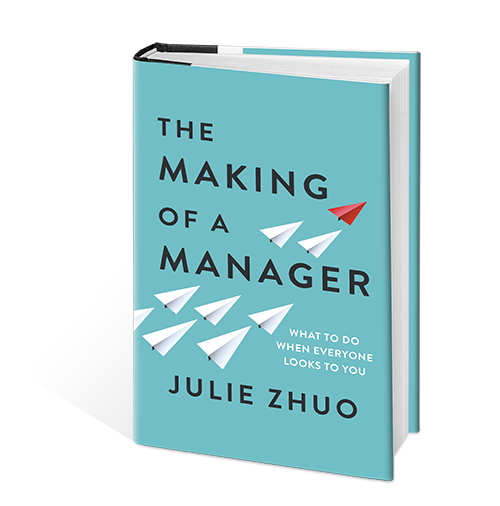 Photo by Robert McGoldrick
Photo by Robert McGoldrick
No one wants to hear you talk about yourself all day long.I can?t stand arrogant people. Ugh, that humblebrag is so obvious.
Sound familiar? Growing up, these sentiments were constant choruses in my household. If I boasted to a friend about acing a test (?SO easy!?) and was within earshot of my mom, I was sure to see her shake her head with the deep disappointment of a thousand Chinese ancestors bearing witness to my transgression of Confucian humility.
Eighteen years of such conditioning, and I could gush modesty like the best of them! I deferred compliments so well, I sometimes turned them all the way back around (?Oh, my dress? It isn?t as nice as yours!?) I gave away credit like Oprah gives away cars (?It wasn?t me, it was this amazing team!?) I gave countless thanks to the gods of luck (?I was so fortunate that my project turned out well!?).
I was the poster child for the golden rule of humility: Whatever you do, don?t give anyone the impression that you think you?re all that.
Except, well? then I wrote a book about management. And as I found out very early on from my publishers, it was non-negotiable that an author establish her credibility to market her book. I was to write an author bio that shone a light on my dazzling accomplishments. I was to tell people why they should listen to me. And horror upon horrors ?I was to actually get out there and promote the hell out of myself and my book!
In the last month since the book?s release, I?ve given at least three dozen Q&As and interviews. They?ve spanned podcasts, articles, in-person events, radio shows, and video clips. I went in bracing myself, thinking, ?I?d rather do taxes than talk about myself all day long, but by the end I?m sure I?ll be better at it.?
Lo and behold, I?ve now come out the other side having learned a thing or two from doing, as well as from some excellent coaching sessions and feedback.
If you find yourself in a similar position wondering, ?How do I talk about myself in the best light without becoming one of those obnoxious people I hate?? then this is for you.
Step 1: Believe everyone has an interesting story to tell
This may seem random as a first step, but it?s actually the most important part of talking about yourself. At the end of the day, if you talk about yourself well, you?re creating a deeper connection with someone else. This is as human as it gets ? you are expressing yourself and being acknowledged, heard and understood in the process. This is a beautiful thing.
As such, there is no such thing as talking about yourself in a vacuum. Connection implies having two sides in the relationship. If you go into a conversation thinking only of yourself ? your reputation, your goals, your achievements ? the other party is going to sense that right away and you?re going to come across as self-centered and arrogant.
You have to believe that other people?s stories are as interesting and important as your own, and that talking about yourself is a way to find common ground with another person. This means that if you see eyes light up when you say you just went deep-sea fishing or that you?re from Nebraska, stop talking and dig deeper. Listen. Be interested in also uncovering the other person?s stories.
You must also believe that you have an interesting story to tell. As a unique and multi-faceted individual on this Earth, only you know the path you?ve led and the experiences and relationships you?ve accumulated along the way. If you don?t believe this makes for an interesting story, why should anyone else? It will be impossible for you to convey the richness and enthusiasm you need to be engaging.
In short:
Care about other people?s stories and show interest in them at cocktail parties, networking events, interviews ? even if you are the one being interviewed!
Repeat to yourself: my story is interesting because my experiences and thoughts are uniquely mine.
Step 2: Realize that you?re the primary actor in your life and so you should also be its biggest narrator
?But my work speaks for itself!? This was always my excuse whenever people asked me why I never talked about myself. Also: ?I value humility!?
Yes, your work says *some* things about you. Certainly if what you say and what you do don?t align, you?re going to lose credibility. But why would you leave the narrative of your life a mystery and ask people to interpret it from what you do? That?s like a teacher asking her students to watch her add fractions on the board in silence as a way to figure out math. If we want to be understood, we need our words to supplement our actions.
Don?t rely on your colleagues or friends to tell your story either. While it?s wonderful when they do, they only know a part of your life. No one else can read your mind and know your passions, your motivations, what you?ve learned, and what your dreams are.
In short:
You are the director and star of your own movie. Nobody else thinks as much about you, or should care as much about your career or your aspirations as you do. So don?t rely on others or your actions to do the talking for you. Take charge of your narrative and realize that it?s good for you to talk about yourself.
Step 3: Find your nuggets of ?why? and focus your story around those
Even if you?re convinced by now that you should talk about yourself, the question still remains: How do I do so in a way that isn?t icky?
The key here is to avoid the mistake of over-focusing on what you did. Nothing is more snooze-inducing than reciting a factual timeline of your life, your resume, or your achievements. The part that builds connection, that turns your story from a couple of black and white statistics into a colorful film, that adds the spice and herbs to your otherwise bland potatoes, is the passion and personal motivation behind your facts.
If you grew up in Nebraska, how are you shaped by that experience?
If you quit your job in 2018, why did you do that?
Why do you get up in the morning every day and do what you do?
Why do you care about the things you care about?
These questions ? your whys ? should form the backbone of your story. They?re the details that give someone a sense of who you really are. They?re what make you interesting. If someone decides they like you or relate to you, it?s because of these nuggets.
Often, our whys come from past failures or negative experiences. Maybe you quit your last job because you weren?t successful at it. Maybe you moved here because you were miserable in Nebraska.
Don?t shy away from talking about those struggles, or poking fun at yourself occasionally. You may worry that it makes you look weak or incompetent, but it does the exact opposite. It makes you feel more human, more authentic, and more trustworthy. Ask yourself: would you rather hang out with the person at a cocktail party who tells you everything they?ve ever done is perfect, or the one whose life story has the natural tensions, twists, and ups and downs of a good Star Wars movie?
If you go back to my very first post on this Year of the Looking Glass blog, I describe my intention to write more. The reason I gave? Something about not liking dreary weather and the feeling of the passage of time. I tried to make it sound deep and semi-poetic, but it?s actually bullshit. The real reason I started my blog is that I struggled with voicing my opinion in front of large groups of people. I was terrified of coming off as wrong or stupid. I couldn?t stand the thought of wasting other people?s time. The idea of putting my opinions on the Internet was incredibly scary. So scary, in fact, that I had tried and failed to do this two times prior (one of those resulted in an anonymous blog with three posts that nobody ever found.)
In order to try and overcome my fear of saying what I thought in front of a large group of people, I decided to set a New Year?s resolution to publish something on the Internet every week for a year.
I only started telling people this real story in the past few months. Guess what? It didn?t make me look weak. It made me more relatable.
In short:
To tell your story well, help people understand not just what you are, but why you are the way you are. What are your motivations and passions?
Step 4: Don?t leave out the facts of your achievements for humility?s sake
Right before the start of my book tour, I had a two-hour session with a speaking coach. She asked me how my book came to be, so I gave her the quick back story:
In order to try and overcome my fear of saying what I thought in front of a large group of people, I decided to set a New Year?s resolution to publish something on the Internet every week for a year. I found writing hugely beneficial and therapeutic so I kept doing it, even after that year was done. Some publishers came across my blog, and that?s how I eventually landed the book deal.
She frowned. ?How did the publishers come across it?? ?I?m not sure,? I said. ?Maybe through Twitter or word of mouth??
?How many people read your blog?? she asked. I paused, trying to remember, ?Couple hundred thousand?? She looked like she might have misheard me. ?Couple hundred thousand? Well, why didn?t you say that to begin with??
It?s a good question. I suppose it?s because it was a minor detail, and dropping it would have seemed like I was trying too hard to be impressive. My coach quickly disabused me of that notion. In the context of my story, this detail made perfect sense, and in fact, its omission made things harder to understand. My story was worse by my trying to appear modest.
This reminded me of a time I was at a networking event with a group of accomplished women. One by one, each women introduced herself. ?Hi, I work on accounting?? ?I?m part of the legal team?? ?I?m in Sales?? At one point, the host interrupted and shouted, ?Ladies! This is no way to introduce yourselves! Tell us what you really do! You are the VP of accounting! You run the legal team! You manage APAC sales!?
Certainly, don?t lie about your accomplishments. Don?t stretch the truth, either. Don?t go about wearing your curriculum vitae on your forehead and ensuring that everyone in your vicinity gets exposed to your list of good deeds. That?s just annoying.
But in short:
If you?re telling a story where the facts emerge naturally, don?t try to hide or play down the awesome things you did because of modesty.
Step 5: Know your ?story clips? that you can call up in any situation
There are a few questions that you are probably going to get asked dozens or hundreds of times in your life. Classics such as the cocktail party ?What do you do??; the interview standard ?Why are you interested in this job??; the first-date opener ?What?s a perfect weekend for you??; the manager?s ?What are your career goals??
Going on book tour for The Making of a Manager, I knew I shouldn?t be surprised by questions like ?Why did you write this book??, ?What?s your biggest management mistake?? or ?Describe how you transitioned to management.?
And yet, before these past few months, I never deeply thought about my answers to these questions. They?re not especially challenging, and since they were all about me, there?s no real right or wrong answer. I could always wing it.
As a result, I?ve given years of yawn-inducing answers. ?I work in design.? ?I hoped to write a book that would help others.? ?On weekends, I like to write and travel with my family.? These answers are safe, expected, and completely unmemorable. I?d hope that a friend would describe me with more exciting answers than these, a clear sign that I should probably invest in a better story. Happily, once I know what I want to say, I can call it up in any future situation.
Instead of ?I work in design,? how about why I love design, or how I got into it?
Instead of ?I hoped to write a book that would help others,? how about sharing a story about my trip to the bookstore when I was a 25-year-old rookie manager?
Instead of ?I like to write and travel with my family,? how about why writing has made my life better, or how I decided on our last family trip?
In short:
Get to know yourself and what your most authentic and interesting responses are for the common questions you?re asked.
Step 6: Go out and tell your story
Get out there and speak up. Express yourself as you really are, in your one-of-a-kind brilliance. Be understood. And in the process, you might just find out that you aren?t alone.
If you found this article useful, you will probably find my new book, The Making of a Manager, useful as well. It?s an everything-you-need to know field guide to leading with confidence, whether you are a new manager, a seasoned manager, or someone interested in management down the road. You can order the book here.



